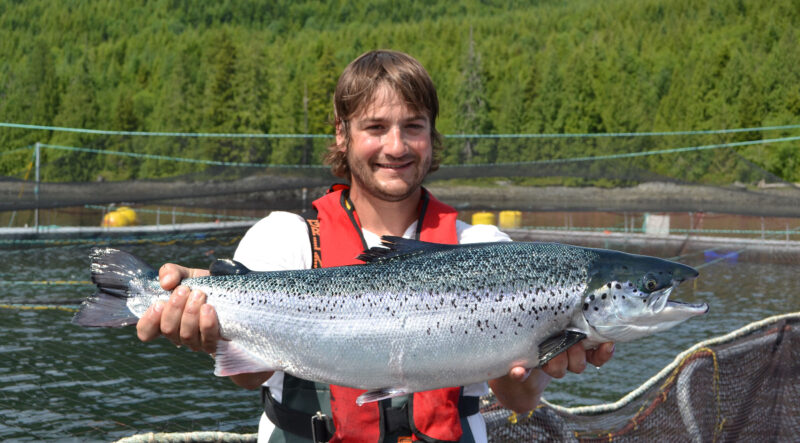Canada’s aquaculture opportunity is unparalleled in the world
But the Liberal government is squandering the opportunity, all to get votes from anti-salmon farming activists, states the Canadian Aquaculture Industry Alliance
By Fabian Dawson and Samantha McLeod
SeaWestNews
Canada’s opportunity to be the world’s best salmon farming nation is being squandered by a Liberal government more interested in getting votes from activists rather than relying on science and traditional indigenous knowledge to grow the industry.
“The opportunity to sustainably produce more salmon in Canada is unparalleled in the world,” said Tim Kennedy, President & CEO of the Canadian Aquaculture Industry Alliance (CAIA) in a podcast presented by Aquaculture North America.
Kennedy said that the Liberals heading into the 2019 elections made “some sort of a deal” to get the support from the activists and segments of the environmental community by promising to go after salmon farmers in British Columbia.
“I think that decision came at a time when the Liberal government had to make a very difficult decision, that was related to the oil and gas sector,” said Kennedy.
Salmon farming – British Columbia’s top agricultural export which generates over $1.2 billion towards the provincial economy, creating thousands of jobs – was sacrificed to get the pipeline going and appease the activists, said Kennedy.
“And let me also say that we have lots of data behind this…we know from 2003 to 2015 over 30 million dollars flowed from US foundations to environmental groups in British Columbia to undermine, criticize, and attack the salmon sector in British Columbia,” he said, pointing to comprehensive analysis by Vivian Krause, a Canadian researcher and writer.
“Right now, in Canada we are in a very challenging moment because we have a federal government which is not so friendly to increasing salmon production all across the country,” said Kennedy.
He warned that the activist-induced political overreach being played out on Canada’s west coast will creep to Atlantic Canada where public polls have shown strong support for aquaculture.
When it comes to aquaculture, the Department of Fisheries and Oceans (DFO) has regulatory oversight in Canada’s West Coast. The provincial governments are the principal aquaculture regulators on the East Coast.
“Two of the three major producers operate on both coasts, and international investors do not see East and West Coast, they see Canada investment. If they’re getting hit really badly by the federal government on the West Coast, then they will question whether they can invest in in Canada in general. That’s the situation that we’re looking at,” said Kennedy.
“We also know that if things keep going the way it is, in a sense backwards, with the salmon sector in British Columbia then there’s no question that it could have negative impacts on the East Coast.”
“The federal government is trying to have it both ways…they’re trying to say that everything that they do on the West Coast to close down salmon farms will not impact the East Coast and that it is just a B.C. issue.”
Kennedy’s comments come in the wake of several legal challenges mounted by First Nations, aquaculture service and supply companies and salmon farmers over two ministerial decisions to shut down fish farms in BC’s Discovery Islands.
The original decision to shutter 19 open-net salmon farms in the Discovery Islands was made in 2020 by former Fisheries minister Bernadette Jordan.
Last April, the Federal Court ordered the government to set aside the decision due to procedural breaches by Jordan, and reaffirmed an earlier ruling that all the evidence provided showed “salmon aquaculture in B.C. poses no more than a minimal risk to wild salmon.”
Current Fisheries Minister Joyce Murray, who took over Jordan’s portfolio after the last election, then ordered up consultations with the stakeholders to meet the procedural requirements before making the same decision as her predecessor earlier this year.
Both ministers ignored their own scientists, who found in 10 studies that the farms had minimal impact on the wild fish migrating through the area.
Separately, Murray and her officials are also working on implementing an open-net pen transition plan for all of BC, expected to be finalized in the Spring of 2023.
In its entirety, the Discovery Island decision alone will shut down more than 24% of BC’s farmed salmon production and kill the livelihoods of 1,500 people in the near term, according to an independent economic analysis.
A coalition of First Nations in BC, industry leaders, government scientists and globally recognised fisheries experts have all criticized the Discovery Islands decision as a political move to appease local activists and secure their votes.
The Coalition of First Nations for Finfish Stewardship (FNFFS), has called on the government to review the decision, respect their jurisdictions and not take actions that would remove salmon farms from their territories.
“When the government works with those activists and their eco-colonialist misinformation rather than us Rightsholder First Nations, they are setting us back regarding reconciliation, self-determination, conservation, and the survival of wild salmon, which is the lifeblood of coastal Indigenous peoples,” said Dallas Smith, a spokesman for the Coalition.
Prior to the Discovery Islands’ decision, BC’s salmon farmers announced a new plan by BC salmon farmers to directly invest $1.4 billion in innovation, new technology and infrastructure, to boost Canada’s post pandemic recovery.
The investments through 2050 would create almost 10,000 new jobs and add a cumulative $44 billion in new economic activity to propel Canada’s Blue Economy, said a report by RIAS Inc., an independent economics consulting firm.
Many of the projects and investments are now on hold.
(Image courtesy of CAIA)

